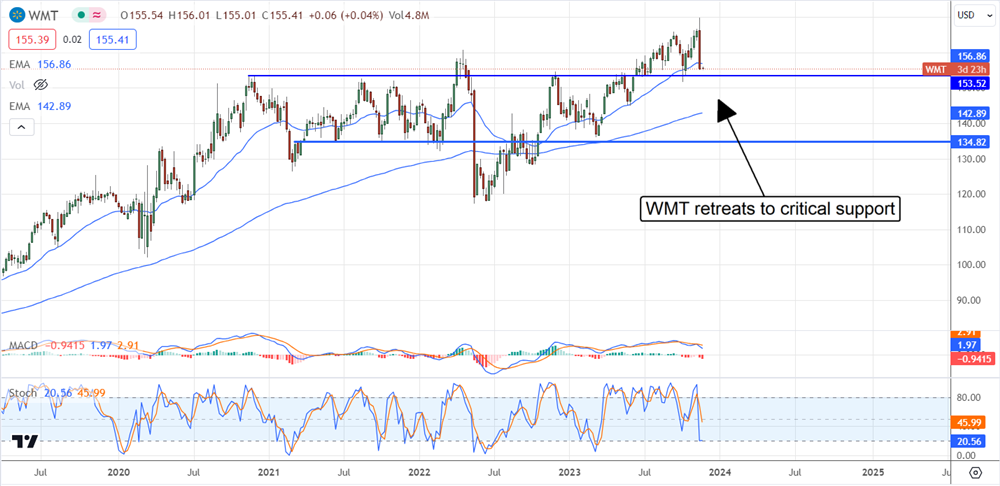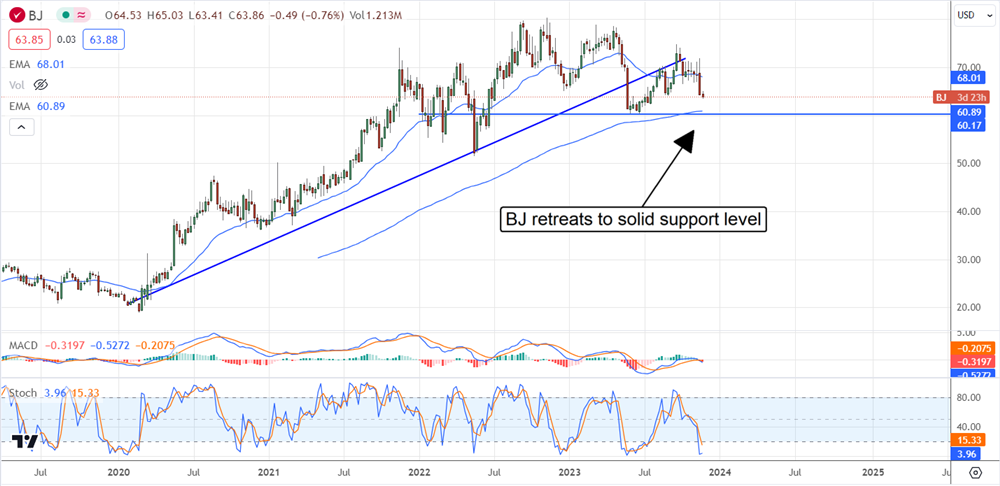
Results from the membership clubs lag retail leaders, but signs within the reports point to improved leverage. While sales and earnings growth in Sam's Club (NYSE: WMT) and BJ's Wholesale Club (NYSE: BJ) lags behind Sam's Club parent Walmart and off-price retailers like TJX Companies (NYSE: TJX), they continue attracting new members, setting them up for accelerated gains when consumer habits shift toward larger ticket and discretionary items.
Until then, member clubs continue to grow, taking market share from competitors like Target (NYSE: TGT) and Kroger (NYSE: KR) and building value for investors. That includes capital returns, dividends, and share repurchases. With shares of Walmart and BJ's down and showing signs of support at critical levels, a buying opportunity is at hand or soon will be.
Sam's Club underperforms Walmart; BJ's follows suit
The membership clubs are well-positioned to meet the needs of consumers in today's environment, but they are not immune to the conditions. Member clubs are growing; Sam's and BJ's grew revenue by about 2.8%, with gains driven by member growth, but members are spending less and less, weighing on their share prices.
Both clubs produced a mid-to-high single-digit increase in member count that should have driven a larger gain in the top line, but weak ticket counts and averages offset the gains. Sam's Club reported a 7.2% increase in membership revenue; the ticket count increased only 4% as old and new members cut back on spending, which was compounded by a 0.2% decline in the check average, and cautionary guidance suggests weakening will continue.
Other good news is the sign of improving financial leverage. BJ's Wholesale had mixed results regarding gross and operating margin changes, but the net result is favorable to investors. The GAAP EPS grew by 2% compared to last year, and the slim $0.01 decline in adjusted earnings was less than expected. The company produced $131 million in adjusted net income or $0.98 per share, $0.04 better than expected, and sufficient to sustain the company's financial outlook and share repurchase program.
Walmart and BJ's Wholesale buy back shares, investors gain leverage
Sam's Club parent Walmart and BJ's Wholesale Club generate healthy cash flows and use the capital to pay shareholders. BJ's does not pay a dividend like Walmart, but its share repurchase program was worth $17.1 million to investors in Q3 or roughly $77 million YTD. On a per-share basis, the diluted count is down nearly 9% and share repurchases are expected to continue.
Walmart repurchased 8.7 million shares by the end of the 3rd quarter and was on track to exceed 10 million by year-end. Quarter-end metrics included $1.3 billion in repurchases, or about 30% of the FCF; the remainder was used to pay dividends and capitalize the balance sheet. Regarding the dividend, Walmart is a Dividend King, paying less than 40% of its earnings and can sustain repurchases and distribution increases indefinitely.

The analysts' support for membership club stocks is mixed
The analysts support membership club stock prices, but the sentiment is mixed between Walmart and BJ's. Analysts rate BJ's at Hold and see it trading near the floor for prices, while Walmart is a Moderate Buy and trading at a value.
The post-release price action has both stocks down. Still, Walmart is below the analyst's lowest price target, suggesting the market is front-running an expected downshift in sentiment and oversold. The analysts have lowered their targets since the Q3 report was released, but insufficient to spark such a decline in the stock price, likewise, with BJ's price action adding to the sense of value. Near-term pressure may persist in these markets, but the bottom is likely near. Assuming they can continue outperforming expectations, the rebound in stock price action may begin early in 2024. 













